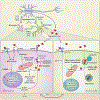Microglia and astrocyte dysfunction in parkinson's disease - PubMed (original) (raw)
Review
Microglia and astrocyte dysfunction in parkinson's disease
Tae-In Kam et al. Neurobiol Dis. 2020 Oct.
Abstract
While glia are essential for regulating the homeostasis in the normal brain, their dysfunction contributes to neurodegeneration in many brain diseases, including Parkinson's disease (PD). Recent studies have identified that PD-associated genes are expressed in glial cells as well as neurons and have crucial roles in microglia and astrocytes. Here, we discuss the role of microglia and astrocytes dysfunction in relation to PD-linked mutations and their implications in PD pathogenesis. A better understanding of microglia and astrocyte functions in PD may provide insights into neurodegeneration and novel therapeutic approaches for PD.
Keywords: Astrocyte; Glia; Microglia; Neurodegeneration; Neurodegenerative disease; Neuroinflammation; Parkinson's disease.
Copyright © 2020 The Authors. Published by Elsevier Inc. All rights reserved.
Conflict of interest statement
Declaration of Competing Interest T.M.D. and V.L.D. are founders of and hold shares of stock options and equity in Neuraly, Inc., and they are inventors of some of the technology discussed in this article, which Neuraly, Inc. has licensed from Johns Hopkins University. T.M.D. and V.L.D. are founders of, and are interim Chief Scientific Officer and Chief Executive Officer of, respectively, hold equity in, serve on the Board of Directors of, and are compensated for their roles as consultants to Valted Seq Inc. T.M.D. and V.L.D. are founders of Valted, LLC and hold an ownership equity interest in the company and the value of patents owned by Valted, LLC could be affected by this article. T.M.D. and V.L.D. are consultants to Inhibikase Therapeutics and own stock options in the company. T.M.D. is a paid consultant to Sun Pharmaceutical Industries Ltd.
Figures
Figure 1.. Neuroinflammation in Parkinson’s Disease
Pathologic α-Synuclein (α-Syn) is released from neurons and transmitted to and activates microglia and astrocytes. PD-associated GBA or LRRK2 mutations impair lysosomal protein degradation, which causes accumulation of α-syn. This leads to oxidative stress and proinflammatory responses. Mutations in Parkin, PINK1 and DJ-1 contribute to enhanced oxidative stress and proinflammatory responses in microglia and astrocytes. This culminates in the release of proinflammatory mediators derived from activated microglia, astrocytes or both, or unknown toxins released from reactive astrocytes that promote dopaminergic neuronal degeneration in PD.
Similar articles
- Dysregulated Interorganellar Crosstalk of Mitochondria in the Pathogenesis of Parkinson's Disease.
Sironi L, Restelli LM, Tolnay M, Neutzner A, Frank S. Sironi L, et al. Cells. 2020 Jan 17;9(1):233. doi: 10.3390/cells9010233. Cells. 2020. PMID: 31963435 Free PMC article. Review. - The cell biology of Parkinson's disease.
Panicker N, Ge P, Dawson VL, Dawson TM. Panicker N, et al. J Cell Biol. 2021 Apr 5;220(4):e202012095. doi: 10.1083/jcb.202012095. J Cell Biol. 2021. PMID: 33749710 Free PMC article. Review. - Parkinson's Disease-Associated LRRK2 Interferes with Astrocyte-Mediated Alpha-Synuclein Clearance.
Streubel-Gallasch L, Giusti V, Sandre M, Tessari I, Plotegher N, Giusto E, Masato A, Iovino L, Battisti I, Arrigoni G, Shimshek D, Greggio E, Tremblay ME, Bubacco L, Erlandsson A, Civiero L. Streubel-Gallasch L, et al. Mol Neurobiol. 2021 Jul;58(7):3119-3140. doi: 10.1007/s12035-021-02327-8. Epub 2021 Feb 24. Mol Neurobiol. 2021. PMID: 33629273 Free PMC article. - Impaired mitochondrial dynamics and function in the pathogenesis of Parkinson's disease.
Büeler H. Büeler H. Exp Neurol. 2009 Aug;218(2):235-46. doi: 10.1016/j.expneurol.2009.03.006. Epub 2009 Mar 18. Exp Neurol. 2009. PMID: 19303005 Review. - Parkinson's Disease-Related Genes and Lipid Alteration.
Fais M, Dore A, Galioto M, Galleri G, Crosio C, Iaccarino C. Fais M, et al. Int J Mol Sci. 2021 Jul 16;22(14):7630. doi: 10.3390/ijms22147630. Int J Mol Sci. 2021. PMID: 34299248 Free PMC article. Review.
Cited by
- Flavonoids, the Family of Plant-Derived Antioxidants Making Inroads into Novel Therapeutic Design Against Ionizing Radiation-Induced Oxidative Stress in Parkinson's Disease.
Behl T, Kaur G, Sehgal A, Zengin G, Singh S, Ahmadi A, Bungau S. Behl T, et al. Curr Neuropharmacol. 2022;20(2):324-343. doi: 10.2174/1570159X19666210524152817. Curr Neuropharmacol. 2022. PMID: 34030619 Free PMC article. Review. - NMDA receptor remodeling and nNOS activation in mice after unilateral striatal injury with 6-OHDA.
de Carvalho MB, Teixeira-Silva B, Marques SA, Silva AA, Cossenza M, da Cunha Faria-Melibeu A, Serfaty CA, Campello-Costa P. de Carvalho MB, et al. Heliyon. 2024 Jul 4;10(14):e34120. doi: 10.1016/j.heliyon.2024.e34120. eCollection 2024 Jul 30. Heliyon. 2024. PMID: 39130441 Free PMC article. - Neuroinflammation and Parkinson's Disease-From Neurodegeneration to Therapeutic Opportunities.
Araújo B, Caridade-Silva R, Soares-Guedes C, Martins-Macedo J, Gomes ED, Monteiro S, Teixeira FG. Araújo B, et al. Cells. 2022 Sep 17;11(18):2908. doi: 10.3390/cells11182908. Cells. 2022. PMID: 36139483 Free PMC article. Review. - Multi-omic insights into Parkinson's Disease: From genetic associations to functional mechanisms.
Schilder BM, Navarro E, Raj T. Schilder BM, et al. Neurobiol Dis. 2022 Feb;163:105580. doi: 10.1016/j.nbd.2021.105580. Epub 2021 Dec 4. Neurobiol Dis. 2022. PMID: 34871738 Free PMC article. Review. - High-Frequency Repetitive Transcranial Magnetic Stimulation Regulates Astrocyte Activation by Modulating the Endocannabinoid System in Parkinson's Disease.
Kang X, Zhang B, Du W, Zhao R, Liu X, Bai Y, Jiang X, Pang J, Zhao C, Mou X, Gao F, Yuan H, Sun X. Kang X, et al. Mol Neurobiol. 2022 Aug;59(8):5121-5134. doi: 10.1007/s12035-022-02879-3. Epub 2022 Jun 7. Mol Neurobiol. 2022. PMID: 35672602
References
- Allaman I, et al., 2011. Astrocyte-neuron metabolic relationships: for better and for worse. Trends Neurosci. 34, 76–87. - PubMed
- Atashrazm F, et al., 2019. LRRK2-mediated Rab10 phosphorylation in immune cells from Parkinson’s disease patients. Mov Disord. 34, 406–415. - PubMed
Publication types
MeSH terms
Substances
LinkOut - more resources
Full Text Sources
Other Literature Sources
Medical
